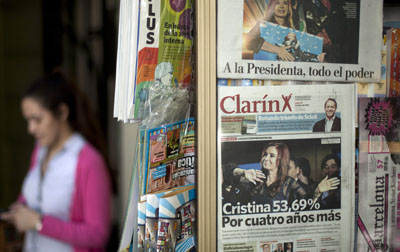The debut of the HD version of Grupo Clarín’s cable news station TN could not have come at a worse time for the Argentine media conglomerate. Conspicuously missing from Monday’s premiere was coverage of a new criminal complaint in which Clarín’s lawyers accused the government of President Cristina Fernández de Kirchner of inciting violence against the media group. In what the company now acknowledges was a misstep, the complaint named six pro-government journalists.
Grupo Clarín, which owns the country’s most widely read daily newspaper, Clarín, as well as radio stations, broadcast and cable television outlets, and an Internet service provider, is Argentina’s principal media conglomerate and one of Latin America’s largest. It is also the principal adversary of President Kirchner in a battle pitting her and media outlets aligned with her government against those opposed to it. The consequence of this bitter fight is an intensely polarized press, as documented in a special report by CPJ in September. On one side, Kirchner’s critics accuse her of stifling press freedom by rewarding allied media and hammering–with regulation as well as advertising–unsympathetic outlets into silence. On the other side, many believe that Clarín has too much power and leverages its huge media holdings to further its private business interests. The rhetoric in the fight has grown increasingly nasty, and both sides of the press devote significant coverage to discrediting each other. Clarín has been accused by the government and pro-government journalists of a variety of sins, which include being liars, monopolists, and perpetrators of crimes against humanity during the country’s military dictatorship.
The Clarín complaint denounces the tone of the allegations, all of which the company denies. But Clarín’s decision to name several pro-government journalists prompted a backlash among its allies in the political opposition and the press–including some of the company’s own prominent journalists.
TN acknowledged its parent company’s complaint only later Monday night, after the Centre for Legal and Social Studies, a prominent human rights group led by well-known journalist and former CPJ International Press Freedom Awardee Horacio Verbitsky, said it would defend the six journalists named in the complaint.
Clarín had tried to mitigate the criticism in a statement published hours earlier Monday on the website of its daily Clarín. In the statement, the group claimed it had never intended to file charges against the journalists, merely to cite them as witnesses in the case against the officials. The company has since announced it will amend the complaint so as to not even name the journalists as witnesses. It also published an editorial Wednesday that apologized for the episode and noted the group’s willingness to tolerate dissent among its own journalists. It said it could acknowledge its mistakes, drawing a comparison to what it called the government’s recalcitrance when confronted with errors.
But Clarín’s state of isolation was reflected in the coverage by the country’s second most widely read daily, La Nación, the group’s most important ally in the so-called “independent press,” in its confrontation with the government and its allies. “Clarín backtracks in its complaint against critical journalists,” was one of the principal headlines in the political section on Tuesday.
“Clarín made a serious error. Not only does [the complaint] go against freedom of expression, but it gives the government an argument with which to play the victim,” was the concise summary of the situation delivered in a message on Twitter by Juan Pedro Tunesi, a congressman with the party that opposes Kirchner. The message raises questions about the negotiations between Clarín and opposition political leaders to find solidarity on the eve of the so-called “7D.” 7D stands for December 7, which will be a moment of reckoning for both sides in the three-year legal fight between Clarín and the government regarding provisions of a 2009 broadcast law that requires divestment of significant holdings. Proponents say the law will curb monopolies and democratize media ownership, although critics say it is also intended to hurt Clarín. In May, the Supreme Court ruled that the injunction blocking implementation of that provision would expire on December 7. What this means in practice for Clarín has been hotly contested for the past six months. Clarín is still pursuing one more legal avenue, which challenges the constitutionality of the law.
The government has made its own missteps as it tries to make “7D” the effective launch of the divestment provision of the broadcast bill. Martín Sabatella, head of the federal broadcast regulator, known as AFSCA, has appeared to dismiss what the Spanish telecommunications company Telefónica itself makes plain–that the Argentine television network Telefé is a subsidiary of the Spanish company. That the broadcaster is owned by a foreign company that is involved in another aspect of telecommunications violates provisions of the broadcast law.
Clarín has used the government’s apparent unwillingness to pursue divestment of Telefé as evidence of the Kirchner administration’s desire to use the law primarily to hurt Clarín. That argument has been made by many independent media analysts as well.
While it is premature to speculate as to the extent of the damage caused by this episode, the fact that Clarín temporarily lost its principal line of defense to the government resulted in an unusual role reversal: The main news producer in Argentina looked clueless in the face of pressure to respond in real time.
One can expect, however, a return to a climate of tension, though perhaps fewer speeches, now that it is clear what is at stake in a power struggle where freedom and processes of democratization are just part of a rhetorical strategy.
